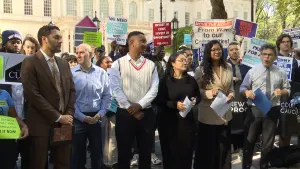More Stories
The U.S. on Wednesday authorized updated COVID-19 boosters for children as young as 5, seeking to expand protection ahead of an expected winter wave.
Tweaked boosters rolled out for Americans 12 and older last month, doses modified to target today’s most common and contagious omicron relative. While there wasn't a big rush, federal health officials are urging that people seek the extra protection ahead of holiday gatherings.
Now the Food and Drug Administration has given a green light for elementary school-age kids to get the updated booster doses, too -- one made by Pfizer for 5- to 11-year-olds, and a version from rival Moderna for those as young as 6.
The Centers for Disease Control and Prevention, which recommends how vaccines are used, also signed off.
Americans may be tired of repeated calls to get boosted against COVID-19 but experts say the updated shots have an advantage: They contain half the recipe that targeted the original coronavirus strain and half protection against the dominant BA.4 and BA.5 omicron versions.
These combination or “bivalent” boosters are designed to broaden immune defenses so that people are better protected against serious illness whether they encounter an omicron relative in the coming months -- or a different mutant that’s more like the original virus.
“We want to have the best of both worlds,” Pfizer’s Dr. Bill Gruber, a pediatrician, told The Associated Press. He hopes the updated shots will “re-energize interest in protecting children for the winter.”
The updated boosters are “extremely important” for keeping kids healthy and in school, said Dr. Jason Newland, a pediatric infectious disease specialist at Washington University in St. Louis.
Parents should know “there is no concern from the safety perspective with the bivalent vaccines, whether Moderna or Pfizer,” Newland added.
Only people who’ve gotten their initial vaccinations -- with any of the original-formula versions -- qualify for an updated booster. That means about three-fourths of Americans 12 and older are eligible. As of last weekend, only at least 13 million had gotten an updated booster, White House COVID-19 coordinator Dr. Ashish Jha estimated Tuesday.
To pediatricians’ chagrin, getting children their first vaccinations has been tougher. Less than a third of 5- to 11-year-olds have had their two primary doses and thus would qualify for the new booster.
This age group will get kid-size doses of the new omicron-targeting booster — and they can receive it at least two months after their last dose, whether that was their primary vaccination series or an earlier booster, the FDA said.
“Vaccination remains the most effective measure to prevent the severe consequences of COVID-19,” Dr. Peter Marks, FDA’s vaccine chief, said in a statement.
While children tend to get less seriously ill than adults, “as the various waves of COVID-19 have occurred, more children have gotten sick with the disease and have been hospitalized," Marks said.
For the updated booster made by Pfizer and its partner BioNTech, 5- to 11-year-olds would get a third of the dose that anyone 12 and older already receives. Pfizer said it could ship up to 6 million kid-sized doses within a week of authorization, in addition to ongoing shipments of adult-sized doses.
Until now, Moderna’s updated booster was cleared only for adults. FDA just expanded that adult bivalent dosage to 12- to 17-year-olds, and authorized half the dose for kids ages 6 to 11.
As for even younger tots, first vaccinations didn’t open for the under-5 age group until mid-June -- and it will be several more months before regulators decide if they’ll also need a booster using the updated recipe.
Exactly how much protection does an updated COVID-19 booster shot offer? That’s hard to know. Pfizer and Moderna are starting studies in young children.
But the FDA cleared the COVID-19 booster tweaks without requiring human test results -- just like it approves yearly changes to flu vaccines. That’s partly because both companies already had studied experimental shots tweaked to target prior COVID-19 variants, including an earlier omicron version, and found they safely revved up virus-fighting antibodies.
“It's clearly a better vaccine, an important upgrade from what we had before,” Jha said earlier this week.
Jha urged adults to get their updated shot in October — like they get flu vaccinations — or at least well before holiday gatherings with high-risk family and friends. People who've recently had COVID-19 still need the booster but can wait about three months, he added.
More from News 12
2:34

Guide: Safety tips to help prevent home burglaries
2:19

Guide: Safety measures to help prevent fires and how to escape one
2:40

Mayor's budget cuts: A controversial solution amidst immigration crisis
2:07

Tips on how to avoid confrontation with sharks while swimming in the ocean
2:33

5 tips to prevent mosquito bites and getting sick from viruses
2:39
